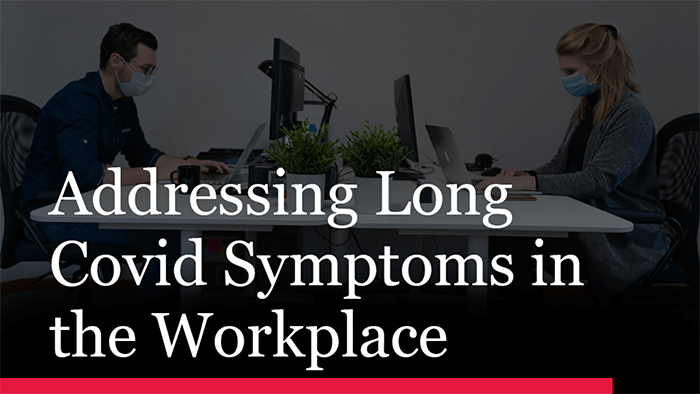As employers begin their march back towards normalcy and require employees to return to work at physical locations, some employees may find this harder than others. Working moms are impacted as their young children are still unvaccinated and child care options may be limited. But another group of workers is having a difficult time as well. In particular, employees who contracted Covid, maybe even in the workplace, and who are continuing to suffer from long Covid symptoms are going to have a difficult time transitioning back to working onsite.
Long Covid Symptoms typically include fatigue and shortness of breath and other respiratory side effects. These symptoms come in a range of severity and may not be easily measured by objective medical testing. For instance, a physician may not be able to verify an employee’s complaints of fatigue by independent testing and will have to rely upon the employee’s description of how they are feeling and what they are experiencing. In some cases, where the employee did not have other medical issues that required routine medical checkups, they may not have even seen a doctor following their “recovery” from acute Covid and hence, may not have a documented medical record of fatigue and shortness of breath or other long Covid symptoms.
When the employer requires all employees to return to work at a physical location, the added commute may exacerbate the long Covid symptoms that were otherwise under control. In response, the employee may ask for the accommodation of being permitted to work from home. At this juncture, the employer must engage in an interactive discussion with the employee and their treating physician to determine the nature of the illness and the reasonableness of the accommodation. And this is where the breakdown occurs.
The employee will have clearly documented evidence of having contracted Covid and the treatment related to it, i.e. hospitalizations, respiratory distress etc. Following their “recovery” from the acute symptoms, these employees may continue to experience long Covid symptoms that were manageable when working from home. In this context, they did not have the added time and stress of a commute and were likely getting more rest, were able to work in calm and comfortable environments, and were able to take breaks as needed, without any impact to their work day or work product or productivity. The simple act of adding back a commute may change the landscape of how the employee can continue to work while experiencing long Covid symptoms.
Some employers have been taking a hardline on their return to work policies. While they may not have seen a change in productivity from their employees working from home, they are eager to return to a sense of normalcy which includes having full offices again, resuming business travel and requiring on site meetings. Employers are likely to be able to win the argument on the reasonableness of the return to work policy as justified by a variety of business factors. And the employee suffering from long Covid symptoms will find it difficult to demonstrate through objective medical testing and certifications from their physicians that they must be allowed to work from home.
At this juncture, should the employer refuse the work from home accommodation, the employee will need to decide whether they are able to return to work at the employer’s terms, seek other employment or consider taking a leave of absence under the protections of FMLA. This is going to be a difficult decision with a significant financial impact on the employee.
The Bottomline: Employees suffering from Covid must continue to seek medical treatment to document their symptoms and request objective medical testing where possible to provide evidence of the symptoms. Upon receiving the return to work policy, the employee should be proactive about requesting the accommodation and providing as much medical evidence as possible to justify the reasonableness of the request.


